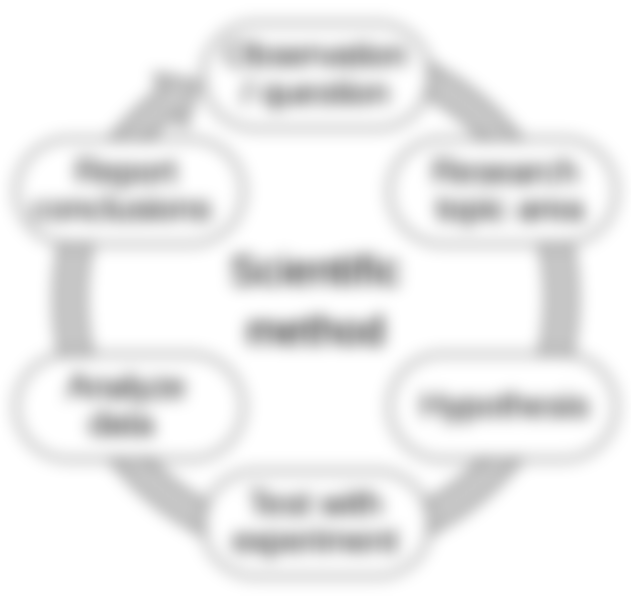Science, the most powerful force on the planet, is now present everywhere in our lives not just in our schools, but also in our homes, workplaces, devices and communities. Modern science is an infinitely complex endeavor, that sometimes overwhelms even the most passionate scientists. But knowing what the world of science is today is the first step towards understanding what kind of modern science might look like in the future. The importance of science has only continued to grow in recent years. Those with scientific curiosity and a fundamental thirst for knowledge know the importance of scientific research and many work at understanding how the scientific method works and is tested within their own fields. However, this is not so common in the general population. For those with minimal scientific knowledge, this article provides a brief introduction on the basics of how the scientific method is used and tested.

The Scientific Hypothesis
The first step to scientific methodology is the scientific hypothesis. A scientific hypothesis is a proposed explanation for a phenomenon or set of phenomena. It is not a theory, and should not be confused with scientific models or scientific theories. A scientific theory is an explanation for all observable phenomena, that is linked to a formulation of the laws of the universe. Theories differ from scientific hypotheses in that they attempt to unify two or more pieces of evidence in order to better explain the observations in the world. This does not imply, that hypotheses are less supported; they simply differ in degree of evidence compared to a theory. For instance, the germ theory of disease is a classic example of a scientific theory, while the phlogiston theory of fire is an example of a scientific hypothesis.
The most general definition of a hypothesis is "a proposed explanation for a set of observations", although some consider this definition to be too broad. For instance, the hypothesis, that the world is flat would fit the definition, but not the more specific definition of the earth is round.
One common mistake, that those without a scientific background make is to confuse a hypothesis with a theory. A theory is a more specific explanation for a set of observations, than a hypothesis and often the explanations are mutually exclusive (You cannot have the theory, that the world is flat and round at the same time). For instance, the theory of evolution is a specific explanation for the origins of life, that explains the appearance and diversity of life on earth consistent with the assumption, that the laws of nature are essentially fixed.
A common misconception among the public is that a hypothesis must be supported by experimental data, before it can be accepted as a real explanation. This is a logical fallacy known as circular reasoning. The statement "I believe the Sun will rise tomorrow, therefore it is the case" is an example of circular reasoning. A better way to state the proposition, that the Sun will rise tomorrow is "If the Sun rises, then I will be relieved", which is a statement that can be supported by any amount of evidence. However, if I see that the Sun is clearly rising in the sky tomorrow, this will confirm, that I made the right decision. This evidence would support my hypothesis, that the Sun will rise. Therefore, my original statement, that I believed the Sun would rise is now supported by evidence.
Oftentimes, scientists will state hypotheses, that are not supported by data in order to rule out hypotheses, that are unlikely to be true. For instance, the statement "I do not think, that life exists on other planets" is a hypothesis that is supported by logic and cannot be tested. Therefore, scientists will state that "there is no conclusive evidence, that life does not exist on other planets" or "planets likely do not contain life as we know it", which can also be supported by evidence. The existence of these statements is evidence, that can be used to support the statement that "life probably does not exist on other planets".
By convention, a scientific hypothesis must have a "null hypothesis" and an "alternative hypothesis". The null hypothesis is the assumption, that the hypothesis is false and all observations will support this. For instance, if the null hypothesis is "X is the cause of Y", then all observations that do not support this can be said to be "not X". This is the position that scientists take as a starting point for all new hypotheses.
The alternative hypothesis is the assumption that the null hypothesis is true and all observations will therefore support this. This can be thought of as "If Y is the case, then X will also be the case". For instance, the alternate hypothesis "X causes Y" can be reformulated as "Y causes X". This reformulation is a simplification of the original, and not every hypothesis can be reformulated in such a way. Even so, one must still attempt to do so, as failing to do so can lead to false or irrelevant conclusions.
In both cases, one should consider the experimental design as well as the potential sources of experimental error. A good design will make any conclusions drawn from the experiment as reliable as possible. A source of experimental error is an assumption made by the scientist, that can never be truly eliminated. For instance, the experimenter may make the assumption, that all potential sources of error are equal; however, if one of these sources is greater than the others, the experiment's results will not accurately reflect reality.
There are different types of experiments, and one should choose the type, that will be most appropriate given the nature of the hypothesis. A common experiment, that is done is a controlled experiment in which the experimenter manipulates one factor the "independent variable" while measuring another factor the "dependent variable" to see if the change in the first factor affects the second.
A common question that arises is what is the purpose of this type of experiment. The purpose is to try to answer a specific question, which may be based on previous hypotheses, that have been proposed by other scientists. This experiment can either provide "evidence" in favor of the hypothesis, or "refute" the hypothesis. A finding of "evidence" supports the hypothesis, while a finding of "no evidence" refutes it.
Other types of experiments can be useful in providing more information, such as inference experiments in which one can make hypotheses and test them, or case studies in which the researcher interviews real people and uses their firsthand accounts to come to conclusions about groups or systems abstractly represented as statistical data. These experiments are less precise in their outcome and are more guides than rules.



That's very informative.